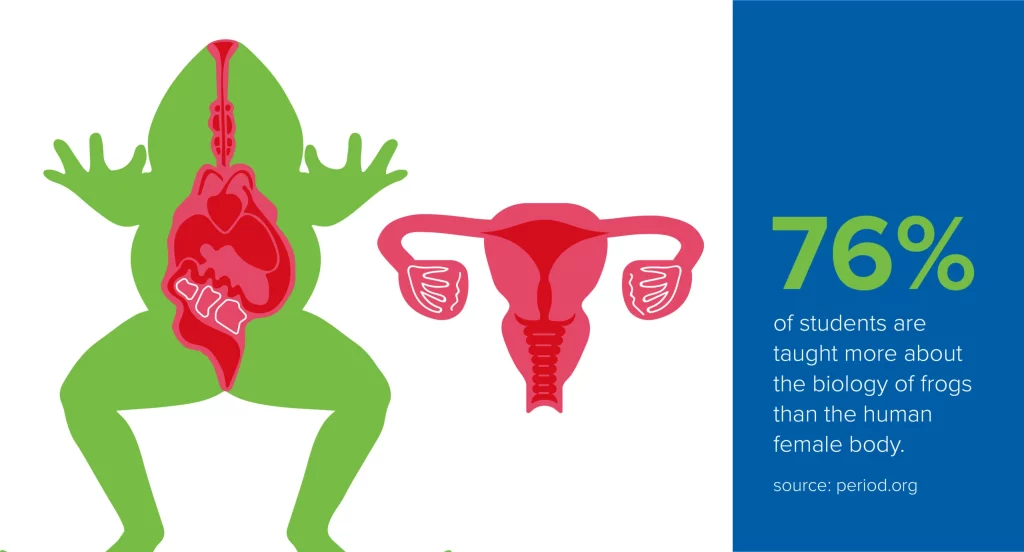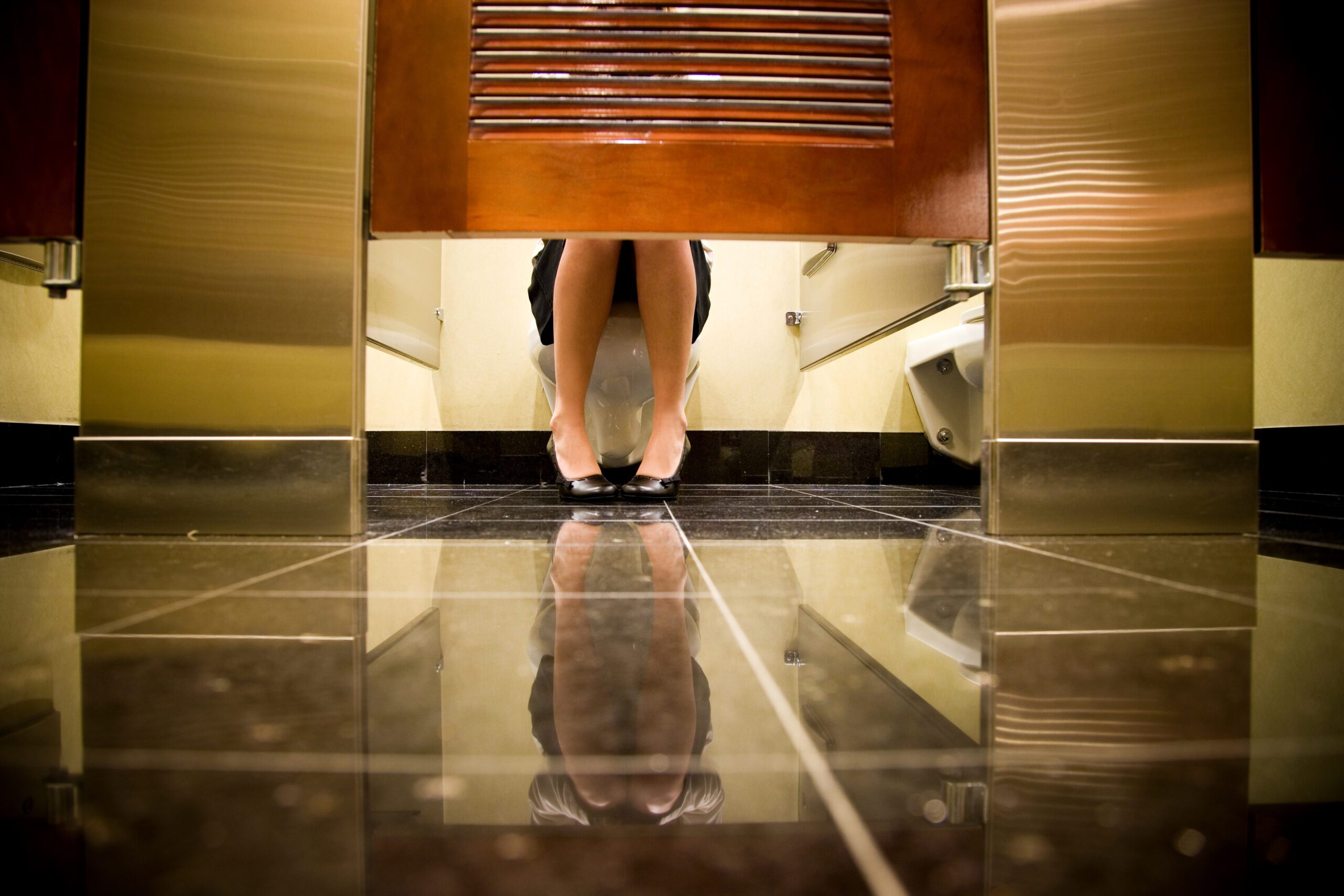Table of Contents
Last Updated on November 18, 2022
Did you know that 1 in 4 students are impacted by period poverty and struggle to afford menstrual hygiene products each month?
Can you imagine having to make the choice between your education or your hygiene needs?
Perhaps you can’t – because period stigma makes this a taboo subject so that non-menstruating decision-makers are left in the dark about what their menstruating students, colleagues, and public washroom visitors need in the way of menstrual hygiene products.
In this article learn about:
- Why students of all ages need period positive washrooms
- The shocking statistics about period stigma
- The basic supplies student menstruators need in public washrooms
- What you can do to start changing the stigma and keep students in class
Students of All Ages Need Period Positive Washrooms
On average, menstruation begins at around the age of twelve, but period cycles can start anywhere between ages 8 to 15 years old.
Many young menstruators are not adequately educated about their bodies and bodily functions, which means they can’t possibly be expected to know what to do in moments of crisis (like getting their period unexpectedly, or starting their period for the first time while at school).
In America, only 13 states require that sex education be medically accurate. This means that children and teenagers are expected to figure out what is ‘normal’ all by themselves – and figure out how to handle it without non-judgmental help.
Imagine being 12 years old and having to ask for menstrual hygiene products from parents or school staff – and then feeling the need to secretly transport products to the washroom.
And this must be repeated multiple times throughout the day to make sure odours don’t build up and leakage doesn’t become an issue.
Many young menstruators may not even know about the impact on their physical health if they don’t regularly change their hygiene products. Unfortunately, a study conducted by Thinx and PERIOD revealed that 51% of students have worn period products for longer than recommended.
In fact, as reported by period.org:
- 76% of students are taught more about the biology of frogs than the human female body.


This is period poverty: “the limited or inadequate access to menstrual products or menstrual health education as a result of financial constraints or negative socio-cultural stigmas associated with menstruation.”
This is a problem, and not just for middle grade and high school students.
College and university students are colleagues, too!
Studies show that 1 in 10 college students are impacted by period poverty – that means they are financially unable to comfortably afford menstrual hygiene products that they need every single month of their lives.
We are failing as a society if 23% of lower income students have to choose between menstrual hygiene products and clothes or food at some time during their education.
Furthermore, companies rely on students during busy work seasons when more seasoned employees are off on holiday (think summer and Christmas time).
Companies of all shapes and sizes depend on:
- High school students
- Student volunteers
- Student interns
- Off-season university and college students
- Placement students
This means that companies have a responsibility to make sure that their student workers have access to menstrual hygiene needs in workplace washrooms too.
As many as 70% of menstruators have left work or school early in order to take care of menstrual health needs.
For companies that focus on hours of productivity, the benefits of ensuring that menstrual hygiene products are readily available in workplace washrooms are undeniable.
By ensuring that washrooms are equipped with free-vend menstrual hygiene products, lost work hours can be minimized, school attendance can be increased and young, student employees can be supported in a period positive space.
Period dignity – the shocking statistics about period stigma
A study conducted by Thinx revealed that 58% of menstruators have felt embarrassed about having their period and 42% have experienced period shaming.
Period stigma results in menstruators isolating themselves out of embarrassment and shame, and missing out on activities in a way that non-menstruators do not experience.
This includes avoiding school due to embarrassment of having no period products on hand, or missing class time in order to track down period products when public washrooms are not equipped.
The same study found that 71% of women have hidden menstruation products on their way to the washrooms, and that 1 in 5 women have felt period shame due to comments made by a male friend.
Despite the stigma and barriers around safe and dignified menstrual health, students are eager to learn more about menstrual health and to help shift the cultural attitudes that surround menstruation. These conversations are happening, and some have even been had on the big screen: read our blog about the Disney-Pixar movie Turning Red, a Period Metaphor.
But there’s still work to be done to improve menstrual health education across the entire population, reduce stigma and support all menstruators with the products and facilities they need.
Basic supplies that student menstruators need in public washrooms
Girls are raised to believe they need to protect non-menstruators from the knowledge that they menstruate – so how can we expect to see menstrual hygiene products become a normal part of public washrooms?
According to the Thinx study, 51% of men believe that it’s inappropriate for women to mention their menstrual cycles in the workplace.
Menstruators young and old face daily stigma in school and office settings, which adds unnecessary stress to their lives.
A simple solution is to ensure that school and office washrooms are equipped with menstrual product vending machines that come with professional refill and sanitation services.
Yet, many decision-makers responsible for the design and product procurement in public washrooms in schools, office buildings, and public buildings, are either:
- not equipped with the information needed to prioritise menstrual hygiene products
OR
- are uncomfortable talking about menstrual hygiene and struggle to procure the needed products
Through education, advocacy, and support this can change, and there are a number of organizations ready to help including: Aunt Flow, Period.org, Thinx, Citron Hygiene and more.
If you’re reading this blog and are looking for some help to upgrade the menstrual hygiene facilities in your washrooms, reach out to us – we can help, and take care of it all for you!
If you’re uncomfortable talking about menstrual hygiene products, chances are you’re uncomfortable thinking about hygienic solutions for menstrual hygiene waste as well. Trust the professionals to keep things clean and safe in your washrooms.
What can you do to start changing stigma and keep students in classrooms?
Citron Hygiene believes that it’s time for businesses to join the #PeriodPositive movement and elevate their menstrual hygiene standards in public washrooms.
Businesses and students interact in many forms every day.
From students accessing a business for extracurricular activities, to students who are seeking employment or volunteer positions with companies, to students simply trying to attend classes at educational facilities – students and businesses depend on one another.
Businesses owe it to their student volunteers, guests and colleagues to equip washrooms with supplies to manage all of their basic biological needs, not just some of them.
Breaking the stigma and empowering decision makers
Without personal experience with menstruation, it can be hard to understand where to begin.
And if you’ve been menstruating all your life, it can still be hard to know how to change things for future generations.
Here are a couple of easy, stigma-changing behaviours that you can do in your personal or professional life.
- Decision-makers can learn more about the need for menstrual hygiene products in public washrooms.
- Menstruators can support advocacy groups and organizations leading the charge in fighting period poverty.
- Ensure that the public washrooms you’re responsible for are equipped with menstrual hygiene products to support the comfort and hygiene of all your washroom visitors.
Let’s change this together.
We want to make creating period positive washrooms as easy as possible for all businesses, so that menstruators around the world soon have access to menstrual hygiene products whenever they need them, wherever they are.
Elevate your washroom experience with Citron Hygiene today.
Related posts:
- Why Creating a Period Positive Washroom Will Bring You More Business
- Touch-free Restrooms Whitepaper
- How to Prevent Staff Shortages and Keep Things Business As Usual This Fall
- School Environments Affect Teacher Wellness
- A New Period in History: It’s Time to Upgrade Your Menstrual Hygiene Services
- Menstrual Vending Machines: Why Free Period Products Matter
- Period Dignity: The Death of the Dirty Metal Blood Box in Public Bathrooms
- How to combat period poverty this holiday season
